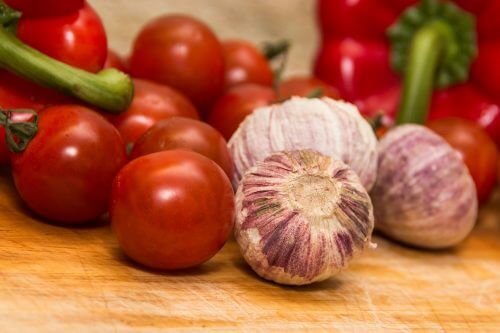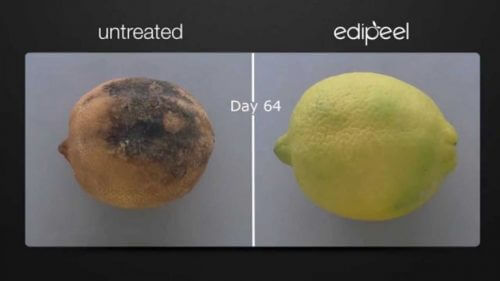Almost half of the fruits and vegetables in the world end up in the trash and cause a significant waste of natural resources and money. New technology offers an original and environmental way to prevent much of this waste, using only natural materials

By Maya Falah, Angle, Science and Environment News Agency
Recently, the disturbing topic of the astronomical amounts of food that are wasted around the world has been quite a bit in the headlines: about a third of the total amount of food is not used at various stages of the chain of growth, production, distribution andAlso with consumers. When it comes to fruits and vegetables, the situation is even worse: about 45 percent of the fruits and vegetables grown around the world do not eventually find their way to the consumer's stomach. In other words, almost half of the crops end up in the trash can. There are various reasons for this: the effects of the weather, the inability to survive the time of arrival from the field to the supermarkets or to the consumer, and also our mistaken buying habits - the consumers - who often buy much more than we actually need and find ourselves throwing away quite a bit of the contents of our refrigerator.
In recent years, since the issue came to the public's attention, various initiatives have arisen to save food that try to reduce the amount of wasted food, such as the promotion of eating Ugly fruits and vegetables and their use in the food and sauces industry, discounted sale of expired food and also the allocation of government budgets to deal with the issue. As a result, various countries in the world did manage to reduce their food losses. Denmark, for example, is The world leader in reducing food waste, after managing to reduce food losses within its borders by 25 percent since 2010.
protective layer
As part of the positive trend, an American startup company called Appeal Sciences A patent they say could help save many of the fruits and vegetables that are being lost today. The patent, Edipeell, is a smooth, thin and transparent (and practically invisible) coating that covers the vegetables and fruits with a kind of protective layer that allows them to survive longer than usual, without developing rot or fungi.

Coating fruits with wax in order to keep them fresh has been practiced for many years in certain fruits, such as apples, grapes and pears. This action is intended to replace the natural wax coating that the fruit produces and which is washed away when the fruit is picked and cleaned, but Edipeel presents a surprising and brilliant innovation: not only is the protective layer made of natural materials only, but it is also produced from the inedible parts of the fruit and which are usually thrown away as waste anyway - such as the leaves, the stems and the shells.
Since throwing away food also has the aspect of serious environmental damage - many resources such as water, land, fuel and labor are invested in the production of the food, and in fact their use goes down the drain when the vegetable or fruit is not finally eaten - then the use of the "waste" parts of the fruit and vegetable makes the patent It is even more environmentally friendly and helps to reduce the amount of waste from agricultural produce twice (once by preventing food waste and once again by using unnecessary parts of the produce), thus saving not only the resources for the production of agricultural produce, but also creating an advantage for the environment, because there is less waste that is buried in the ground and emits gases greenhouse for the atmosphere.
According to the company, their patent can be used already in the growing phase, as well as after picking or on the conveyor belt in the packing house. Applying the layer of natural clay on the fruit or vegetable protects its outer surface and protects it from the elements, reduces the loss of water that occurs naturally after picking and prevents the fruit or vegetable from oxidizing in contact with the air - all this while reducing the need to use refrigeration along the supply chain His. According to them, the patent is odorless, tasteless and not visible at all, so it should not harm the consumer's experience, but only improve it. The company claims that it has been able to extend the freshness of products such as blueberries and green beans by five times the usual time.
Edippel video:
Edipeel's technology has already been approved by the US Food and Drug Administration as safe for use and so far more than 40 million dollars have been invested in it by venture capital funds. If he manages to live up to the optimistic forecasts and penetrate the world market, this could change the face of agriculture. Integrating it into farms and orchards will eliminate the need to pick fruits and vegetables that are not yet fully ripe just so they can survive the long journey to the consumer (which can take weeks), will reduce the use of gas for canning (an artificial process designed to move the fruit from unripe to ripe) and the use of artificial wax. In addition, it will be possible to import and export agricultural produce to places much further away than is currently possible, while maintaining its quality and freshness.
It is understood that the new patent could also help to significantly reduce the amount of produce wasted today, already at the harvesting stage, which would increase the farmer's profit from the produce and in the end may also lower the price for the end consumer. In addition, the use of the patent already in the growing phase can also help repel pests and fungi and thus reduce the need for the use of pesticides.
2.5 million tons
According to the estimates of the "Collect Israel" organization, approximately 2.5 million tons of food per year are thrown into the trash every year in Israel. That is, about 35 percent of all food produced, when it is estimated that it can be saved About half of the food is wasted. The fruit and vegetable waste rate in Israel is similar to the world average, about 44 percent. "These are highly perishable products, which are vulnerable to damage such as rotting and shrinking," explains Prof. Ron Porat from the Volcanic Center. "In the case of cucumbers, potatoes and peppers, more than half of the produce is lost somewhere in the food supply system."
It seems that if everything works as it should, a patent like Edipeel will certainly be able to help preserve the freshness of the produce for a long time and keep pests away from it. This way, the amount of produce kept fresh will increase and many vegetables and fruits will not end up in the trash.

3 תגובות
In packing houses, the citrus fruit and other fruit have been coated with dong with various preservatives for many years.
What is special about this coating?
For some reason the article smells like an advertisement for the new coating out of concern for the profits of the manufacturer of this coating and not out of concern for the quality of the environment or the welfare of the hungry in the third world.
"Eating Ugly Fruits and Vegetables" initiative: buying second-class vegetables and fruits at the prices of second-class vegetables and fruits.
No doubt, they invented the wheel here, but this time under a shiny ecological coating!